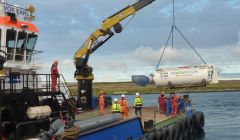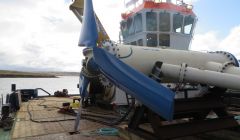Energy / Bluemull tidal project powers ahead
MAJOR progress in efficiency has been claimed for the “world’s first” tidal turbine array operating in Bluemull Sound.
According to Nova Innovation chief executive Simon Forrest, the cost of producing tidal electricity has been driven down 15 per cent since the start of the £17 million Enabling Future Arrays in Tidal (EnFAIT) scheme 18 months ago.
He also expects costs to be cut by 40 per cent by 2022. The savings are being achieved largely though improved location of the turbines within the tidal stream.
Nova Innovation is the lead company in the EnFAIT scheme that involves nine EU based industry and academic partners and is intended to demonstrate the economic viability of tidal power.
Quoted in Energy Live Forrest said: “Even at this early stage of the project, we have achieved significant cost reduction successes and EnFAIT is already helping to map out the world’s most extensive power supply chain across Europe.
“The UK has been a pioneer in developing this new industry: we remain the global leader in the development of tidal technologies, and the burgeoning supply chain in Scotland and across Europe demonstrates the economic benefits this sector can bring.”
Nova is predicting an “explosion of interest” from energy investors around the world if it can hit the 40 per cent target.
Nova’s Shetland manager Patrick Ross-Smith said that the company had been working “flat out” for some time and was presently shifting a turbine to a different location at the site.
Increased efficiency is expected to come largely from a better understanding of tidal flows and locating turbines accordingly.
Nova Innovation is also leading a consortium that has won a major new European project, ELEMENT, that will use artificial intelligence to improve tidal turbine performance and accelerate commercialisation of tidal energy.
The €5 million project starts in June this year and runs until May 2022. The control technology will be demonstrated on a floating tidal device in the Étel estuary in Brittany and on a turbine in the Shetland array.
Become a member of Shetland News
Energy giant SSE, meanwhile, is “taking active steps” to sell off its North Sea gas production as it seeks to “decarbonise” its business and concentrate on renewables.
The energy supplier has stakes in a number of offshore fields in the UK, including 20 per cent of the Greater Laggan Area in the West of Shetland, which is operated by Total.
SSE chief executive Alistair Phillips-Davies writes: “Climate change is the greatest challenge of our generation.
“That’s why today we have written to the government to say that net zero emissions can be achieved by 2050, but only if we electrify our economy.
“But we can’t rely on the government to lead this energy revolution alone. Companies like ours have to drive it forward too.
“Our efforts centre on offshore wind, onshore wind and solar power.”
Become a member of Shetland News
Shetland News is asking its readers to consider paying for membership to get additional perks:
- Removal of third-party ads;
- Bookmark posts to read later;
- Exclusive curated weekly newsletter;
- Hide membership messages;
- Comments open for discussion.
If you appreciate what we do and feel strongly about impartial local journalism, then please become a member of Shetland News by either making a single payment, or setting up a monthly, quarterly or yearly subscription.






































































